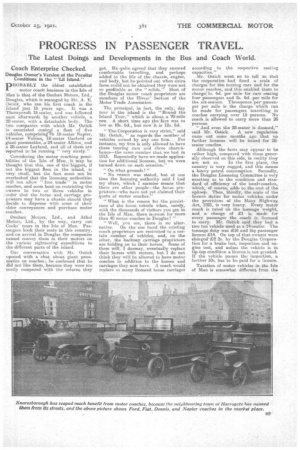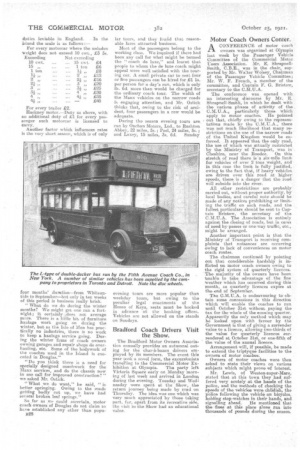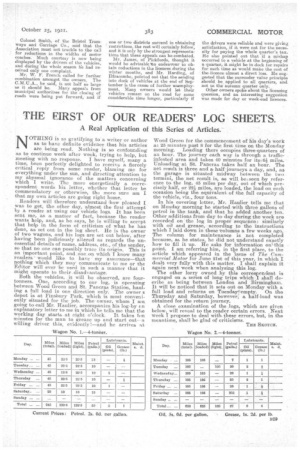PROGRESS IN PASSENGER TRAVEL.
Page 23

Page 24

Page 25

If you've noticed an error in this article please click here to report it so we can fix it.
The Latest Doings and Developments in the Bus and Coach World.
Coach Enterprise Checked.
Douglas Owner's Version of the Peculiar Conditions in the "'LH Island."
pROBA BLY the oldest estabWieci motor coach business in the Isle of Alan is that of the Onchan Motors, Ltd., Douglas, which is managed by Mr. A. E. Ostick, who ran his first coach in the island just 15 years ago.. It. was a. Thornycraft 18-seater, and was followed soon afterwards by another vehicle, a 22-seater, with a detachable body. The two companies with which Mr. °stick is associated contr21 . a fleet of five vehicles, comprising—An 18-seater Napier, 14-seater Vulcan, 18-seater Garford on giant pneumatics; A 24-seater Albion, and a 28-seater Leyland, and all of them are reported to be running " very nicely."
Considering the muteg coaching possibilities of the Isle of Man,.: it May be thought that this, one of the biggest, if . not the biggest fleet in the island, is very small, but the fact must not h7s overlooked that the licensing authorities will not allow " free trade" in motor coaches, and seem bent on restricting the owners to two or three, vehicles in order that the horse • and carriage proprietors may have a chance should they decide to dispense with some of their older conveyances and purchase motor coaches.
0/when Motors, Ltd., and Athol Motors, Ltd., by the way, carry out Cooks' tours in the Isle of Man. Passengers book their seats in this country, and on arrival in Douglas the companies named convoy them in their motors on the various sightseeing expeditions to the different parts of the island.
Our conversation with Mr. Osijek opened witih a chat about giant pneumatics on coaches• he confessed that he did not like them, 'because they were too costly compared with the returns they got. Be quite agreed that they ensured comfortable travelling, and perhaps added to the life of the chassis_, engine, and body, but he pointed out when extra fares could not be obtained they were not
so profitable as the " Most of the Douglas motor coach proprietors are members of the Section of the Motor Trade Association.
The principal, in fact, the only, day tour in the island is the " Round the island Tour," which is about a 70-mile run. A short time ago the fare was as low as 10s. bd., but new it is 12s. bd.
" The Corporation is very strict," said Mr. Wick, " as regards the number of vehicles owned by any one firm. For instance, my firm is only allowed to have three touring cars and three chars-it, hancs—the same number that we had in 1913. Repeatedly have we made application for additional licences, but we were turned down on each occasion."
" On What grounds?"
" Na reason. was stated, but at one time the licensing authority said I had my share, which I surmise means that there are other people—the horse proprietors—who have nut yet claimed their quota of motor coaches. '
"What is the reason for the persistence of the horse vehicle when, surely, with the thousands of visitors you get in the Isle of Man, there is,roorn for more than 40 motor coaches in Douglas?
" Well, you see, there is no alternative. On the one hand the existing coach proprietors are restricted to a certain number of vehicles, and, an the other, the hackney carriage proprietors are holding on to their horses. Some of them will, I claresay, eventually replace their horses with motors, but I do not think they will be allowed ta have motor coaches in addition to the horses and carriages they now have. A coach would replace so many licensed horse carriages according to the respective seating capacities."
Mr. °stick went en to tell us that the corporation had fixed a scale of charges for the touring cars and for the motor coaches, and this enabled them to charge:1s. 6d. per mile for cars seating four passengers and 2s. 6d. per mile for the six-seaters. Threepence per:passenger per mile is the charge which can be made for passengers travelling, in coaches carrying over 15 persons. No coach is allowed to carry more than 28 persons.
"And even the 28-seater is doomed," said Mr. °stick. A new regulation came out some months ago that no further licences will be issued for 25seater coaches.
Although the fares may appear to be rather high, compared with those generally observed on this side, in reality they are not so. In the first place, the eountry is very rugged, and this means a heavy petrol consumption. Secondly, the Douglas Licensing Committee is very exacting as to the condition and standard of efficiency of the localicoaches, which, of course, adds to the cost of the upkeep. Then, thirdly, the scale of the licence duties for motor vehicles under the provisions of the Manx Highway, Act, 1921, is very heavy. Every Motor coach is rated on tho tonnage weight, and a charge of .£1. is.. made for every passenger the coach is licensed to carry. Mr. Ostick said they bad a two ton vehicle irSed as a 14=seater. The tonnage duty was M6 and the passenger licence £14. On top of that owners were chargeti'L2.2s. by the Douglas Corporation for a brake test, inspection and engine test, and unless the vehicle is in tip-top condition a liceeee is not granted. If the vehicle passes the inspection, a further 105. has to be paid for a licence.
Taxation of motor vehicles in the Isle of Man is somewhat different from the citifies leviable in England. In the island the scale is as follows :— For every motorcar where the unladen weight does not exceed 10 cwt., £3 5s.
Hackney motor.—Duty as above, with an additional duty of £1 for every passenger such motorcar is licensed to carry.
Another factor which influences rates is the very short season, which is of only four months' duration—from Whitsuntide to September—but only in ten weeks of this period is business really brisk. " What do we do during the winter months? We might get One run a fortnight; it certainly odoes not average Inure. There is a little bit of furniture haulage work going on during the winter, but as the Isle of Man has practically no industries, there is no work to keep a haulage service going. During the winter firms of coach owner* owning garages and repair shops do overhauling, etc. Some of tho bodywork of the coaches used in the Island is executed in Douglas."
"Do you think there is a. need for specially designed coachwork for the Manx services, and do the chassis now in use call for improved construction?" we asked Mr. °stick.
" What we do want," he said, " is better springing. Owing to the roads getting badly cut up, we have ha,d several broken leaf springs." So ,far as we could ascertain, motor coach owners of Douglas do not claim to have established any other than popu ,a28 lar tours, and they fourld that reasonable fares attracted business.
Most of the passengers belong to the working class. We inquired if there had been any call for what might be termed the " coach de, luxe," and learnt that people to whom the de luxe coach might appeal were well satisfied with the touring ear. A small private car to seat. four Or five passengers can be hired for Bl is. per person for a day's run, which is only N. 61 more than would be charged for the ordinary coach tour. The width of the Manx vehicles on the narrow roads is engaging attention, and Mr. °stick thinks that, owing to the risk of accident, four passengers in a row would be adequate.
During the season evening tours are run by Onchen Motors, Ltd.. to Rushton Abbey, 22 miles, 5s.; Peel, 24 miles, 5s.; and Laxey, 15 miles, 3s. 6d. Sunday evening tours are more popular than weekday tours, but owing to the peculiar legal enactments of the House of Keys, seats must be booked in advance at the booking office's. Vehicles are not allowed on the stands on Sundays.
Bradford Coach Drivers Visit the Show.
The Bradford Motor Owners Association annually provides an autumnal outing for the char-a-banes drivers employed by its members. The event this year took a novel form, the excursionists travelling to the Commercial Motor Ex
hibition at Olympia. The party left Victoria Square early on Monday morning of last week and arrived in London, during the evening. Tuesday and Wed, neaday were spent at the Show, the return journey being made by road on Thursday. The idea was one which was very much appreciated by those taking part, for, apart from its recreative side, the visit to the Show had an educational value.
Motor Coach Owners Corner.
ACONFERENCE of motor coach' owners Was organized at Olympia last week by the Passenger Vehicle
Committee of the Commercial Motor Users: Association. Mr. E.. ShrapnellSmith, C.B.E., was in the chair, sup ported by Mr. Walter Wolsey, Chairman of the Passenger Vehicle Committee; Mr. W. F. French, a Member of the committee, and Captain F. G. Bristow, secretary to the C.D.I.U.A.
The conference was opened with an interesting discourse by Mr. E.
Shrapnell-Smith, in which be dealt with the. various phases of activity of the C.M.D.A., particularly those which apply to motor coaches. He pointed out that, chiefly owing to the representations made by the C.M.U.A., there was not much llkelibood that many restrictions on the use of the narrow roads of the United Kingdom would he enforced. It appeared that the only road, the use of which was actually restricted by the Ministry of Transport, was in Cheshire near the Roodee. On this stretch of road there isla six-mile limit for vehicles of over 2 tons weight, and in this case the limit is fully justified, owing to the fact that, if heavy vehicles are driven over this road at higher speeds, there is a danger that theroad will subside into the river.
All other restrictions are probably carried out, without proper authority, by local bodies, and careful note should be made of any notices prohibiting or limiting the traffic on such roads, and the fullest particulars should be sent to Captain Bristow, the secretary of the C.M.U.A. The Association is entirely against the closing of roads, but i eases of need by-passes or one-way traffic, etc., might be arranged.
Another important point is that, the Ministry of Transport is receiving complaints that nuisances are occurring owing to lack of conveniences on motor coach routes.
The chairman continued by pointing out that considerable hardship is inflicted on motor coach owners owing to the rigid system of quarterly licences. The majority of the owners have been Imable to take advantage of the fine weather which has occurred during this month, as quarterly licences expire at the end of September.
The C.M.U.A. is endeavouring to-ohthin some concessions in this direction which will enable the coaches to run until October 31st without paying the tax for the whole of the-ensuing quarter. Apparently the only method which may he looked _upon with favour by the Government is that of giving a surrender value to a licence, allowing two-thirds of the value for quarterly licences surrendered at October 31st, or one-fifth of the value of the annual licence.
Arrangement will, if passible, be madeto extend the triptyque facilities to the owners of motor coaches.
Owners of motor coaches were then asked to state their views on various subjects which might prove of interest.
Mr. Lewis, of Weston-super-Mare, stated that at this town they had suffered very acutely at the hands of the police, arid the methods of checking the )speecla of the vehicles were childish, the police following the vehicle on bicycles, holding stop-watches in their hands, and signalling ahead. He mentioned that the -fines at this place alone ran into thousands of pounds during the season.
Colonel Smith, of the Bristol Tramways and Carriage Co., said that the Association must not truckle to the call for reductions in the widths of motor coaches. Much courtesy is now being displayed by the drivers of the vehicles, and during the whole season he had received only one complaint. Mr. W. F. French called for further combination amongst the owners. The C.M.U.A., he said, is not half so large as it should be. Many appeals from municipal authorities for the closing of roads were being put forward, and if one or two districts succeed in obtaining restrictions, the rest will certainly follow, and it is only by the strongest represents. thins that these appeals can be combated.
Mr. James, of Piekfords, thought it would be advisable Ito endeavour to obtain reductions in the licences during the winter months, and Mr. Ilarding, of Ilfracombe, pointed out that the sending into dock of vehicles at the end of September is the cause of further unemployment. Many. owners would let their vehicles remain on the road for some considerable time longer, particularly if the drivers were reliable and were giving satisfaction, if it were not for the necessity for paying the whole quarter's tax. He also pointed out that if a mishap occurred to a vehicle at the beginning of a quarter, it might be in dock tor repairs for such time as would make the cost of the. licence almost a direct loss. He suggested that the surrender value principle should be applied to all quarters, and• not to the autumn quarter only.
Other owners spoke about the licensing question, and an interesting suggestion was made for day or week-end licences.






























